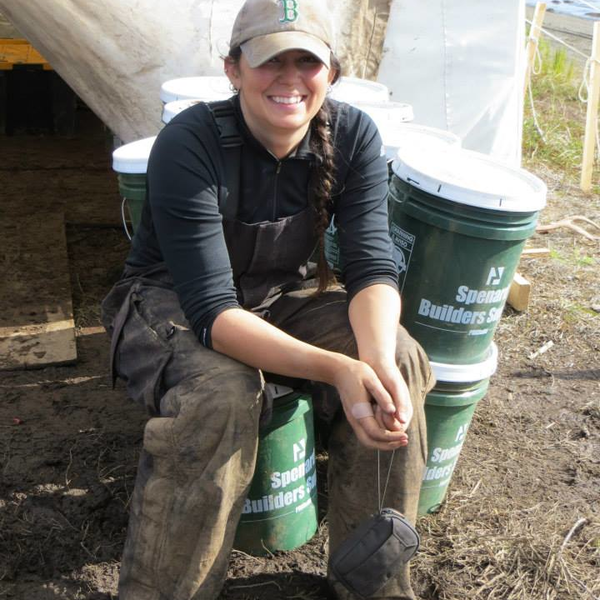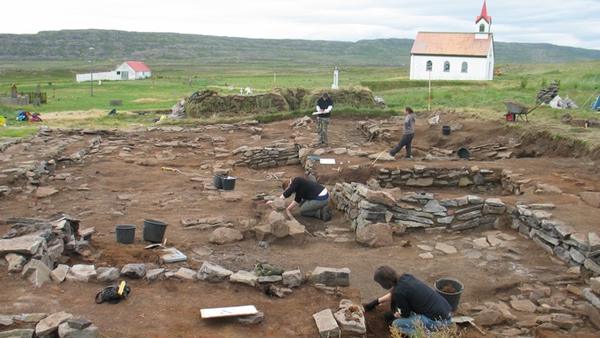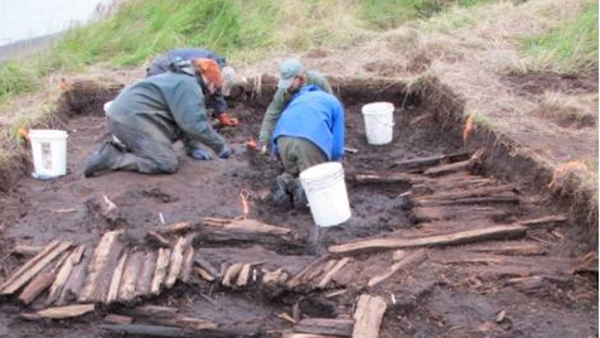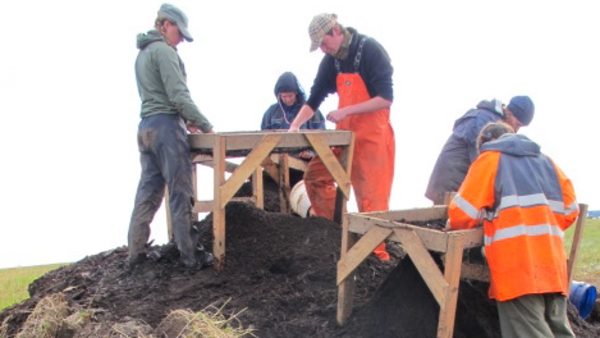Carly Ameen

The MSc Archaeology of the North is the only programme of its type in the world, investigating the material culture and heritage of the far northern hemisphere. With an emphasis on colonisation and culture contact, lifeways and world-views, this programme will help you develop knowledge and critical awareness of issues specific to northern archaeology, providing a solid foundation for further study or professional employment.
This course has a September 2024 start date. Apply Now.
Eligible self-funded international Masters students will receive the Aberdeen Global Scholarship. Visit our Funding Database to find out more.
Developing the research skills required to investigate the material culture and heritage of the far northern hemisphere, a region that includes Scotland and the circumpolar region from Mongolia to the Canadian Arctic.
With an emphasis on colonisation and culture contact, lifeways and world-views, every graduate is provided with a thorough knowledge of the theory and practice specific to northern archaeology, together with the foundation for further study or professional employment.
In addition, every graduate will have acquired detailed competence in a specialist regional or chronological field, chosen from a range of options across the entire northern world.
The degree can be taken as preparation for higher research, as a professional qualification or purely for interest.
Information for part-time students: The course will be spread over two years. In year 1, students will take PD5006, AY5002*, and AY5501. In year 2, students will take AY5001, AY5504*, and AY5902.
*Subject to agreement, these courses can be replaced with other Archaeology courses or one from a sister discipline, such as Anthropology (note, only a maximum of 30 credits can be taken in nonarchaeology courses across Stages 1 and 2).
Subject to agreement, AY5002 can be replaced with other Archaeology courses or one from a sister discipline, such as Anthropology (note, only a maximum of 30 credits can be taken in nonarchaeology courses across Stages 1 and 2).
30 Credit Points
In a series of research-led lectures and seminars, students investigate what characterises the Archaeology of the North from environmental, socio-cultural, and ideological aspects. We examine several inter-locking themes, from the first colonisations of the North tracing how these earlier populations established the cultural, ethnic and religious diversity that define later periods. Students will be introduced to the ecological characteristics of higher latitudes, and examine the diverse ways in which communities have made the Northern World their home. We also examine how human communities have responded to climate changes in the past, resilience and adaptation, technology, and spirituality amongst Northern peoples
30 Credit Points
In this course students will follow the development of archaeological thought from its roots in the scientific revolution of the 17th century through to the post-modern thinkers and finally discovering where the current theoretical debates stand. Students will explore the links between the theoretical development of archaeological research and the general developments in the history of science and philosophy. Students also explore different methodologies central to archaeological research, discuss what constitute archaeological data, and how to design a research project. Students will also discuss research ethics, and scientific agendas. These issues are explored through a series of lectures and seminars.
Subject to agreement, AY5504 can be replaced with other Archaeology courses or one from a
sister discipline, such as Anthropology (note, only a maximum of 30 credits can be taken in nonarchaeology courses across Stages 1 and 2).
30 Credit Points
In a series of text based student-led seminars we study past Northern Peoples and Cultures through key topical debates, characteristic for different cultural regions and time periods. In the seminars students examine a range of northern contexts, from prehistory to more recent times all over the Circumpolar North. Students encounter topics as versatile as animal domestication in Northern Eurasia, Scandinavian Vikings, and Colonial North America illustrating the diversity of life and thought in Northern communities. Each seminar will also explore how particular key issues have become central to the 'identity' of archaeological research in the respective areas
30 Credit Points
As an advanced engagement with current trends and approaches in Northern Archaeology students examine current cutting edge debates associated with new theories and methodologies in archaeological research. Students will encounter the versatility of methodological and theoretical approaches in Northern research through four different themes central to the Archaeology of the North; Body and Death, Heritage and Memory, Social Space and Structures, Human and Environment. Each theme is explored through series of research led seminars and a practical, approaching the theme from different theoretical/methodological angels. The main assessment of the course is an Internal Masters Conference on these four themes.
Previous, final research projects include:
60 Credit Points
This course let the students build on the skills and knowledge they acquired in the other courses of the MSc in Archaeology of the North, as they design and conduct their own research project. The student conduct independent studies on a topic of their own choice within the northern theme. All students will receive staff supervision in identifying a suitable topic and in completing an original research project. The course also includes a number of research seminars, and in addition to their written dissertation students are expected to produce a short popular piece presenting their research to a non-academic audience.
We will endeavour to make all course options available; however, these may be subject to timetabling and other constraints. Please see our InfoHub pages for further information.
| Fee category | Cost |
|---|---|
| EU / International students | £22,000 |
| Tuition Fees for 2024/25 Academic Year In addition to the tuition fees, students will be required to pay an offsite training fee TBC. | |
| UK | £10,000 |
| Tuition Fees for 2024/25 Academic Year |
Further Information about tuition fees and the cost of living in Aberdeen
Self-funded international students enrolling on postgraduate taught (PGT) programmes will receive one of our Aberdeen Global Scholarships, ranging from £3000 to £8,500, depending on your domicile country. Learn more about the Aberdeen Global Scholarships here.
To see our full range of scholarships, visit our Funding Database.
Assessment for each 30-credit taught module is on the basis of one 3000-word essay and one project on topics relevant to the course, chosen in consultation with the course coordinator. The nature of the project may vary from course to course and include reports, exercises and presentations.
Following successful completion of the taught modules, students are allowed to advance to the dissertation, which involves in depth original research on a topic chosen in consultation with the advisor.
The information below is provided as a guide only and does not guarantee entry to the University of Aberdeen.
2:1 (upper second class) UK Honours degree, or an Honours degree from a non-UK institution which is judged by the University to be of equivalent worth in Archaeology or a related discipline.
2:2 in Archaeology or related discipline plus related professional experience.
Please enter your country to view country-specific entry requirements.
To study for a Postgraduate Taught degree at the University of Aberdeen it is essential that you can speak, understand, read, and write English fluently. The minimum requirements for this degree are as follows:
IELTS Academic:
OVERALL - 6.5 with: Listening - 5.5; Reading - 5.5; Speaking - 5.5; Writing - 6.0
TOEFL iBT:
OVERALL - 90 with: Listening - 17; Reading - 18; Speaking - 20; Writing - 21
PTE Academic:
OVERALL - 62 with: Listening - 59; Reading - 59; Speaking - 59; Writing - 59
Cambridge English B2 First, C1 Advanced, C2 Proficiency:
OVERALL - 176 with: Listening - 162; Reading - 162; Speaking - 162; Writing - 169
Read more about specific English Language requirements here.
You will be required to supply the following documentation with your application as proof you meet the entry requirements of this degree programme. If you have not yet completed your current programme of study, then you can still apply and you can provide your Degree Certificate at a later date.
Eligible self-funded post graduate taught (PGT) students will receive the Aberdeen Global Scholarship. Explore our Global Scholarships, including eligibility details, on our dedicated page.
Aberdeen Global ScholarshipsGraduates from the programme move into a variety of careers. Many also choose to further their academic careers by undertaking PhD's.
You will be taught by a range of experts including professors, lecturers, teaching fellows and postgraduate tutors. Staff changes will occur from time to time; please see our InfoHub pages for further information.
Facilities available within Archaeology and the Colleges of Physical and Life Sciences

Staff and Research Students at University of Aberdeen are involved in a range of excavations and field projects, including both those directed by University of Aberdeen staff and in collaboration with other individuals and institutions.
Find out more
Archaeological research at Aberdeen spans the the arts and humanities, physical and biological sciences, reflecting the interdisciplinary nature of the Archaeology and the collaborative ethos within the University.
Find out more
In partnership with the village corporation Qanirtuuq, Inc. and the Yup’ik Eskimo village of Quinhagak, Alaska, is working to record archaeological sites threatened by rising sea levels along the Bering Sea.
Find out more